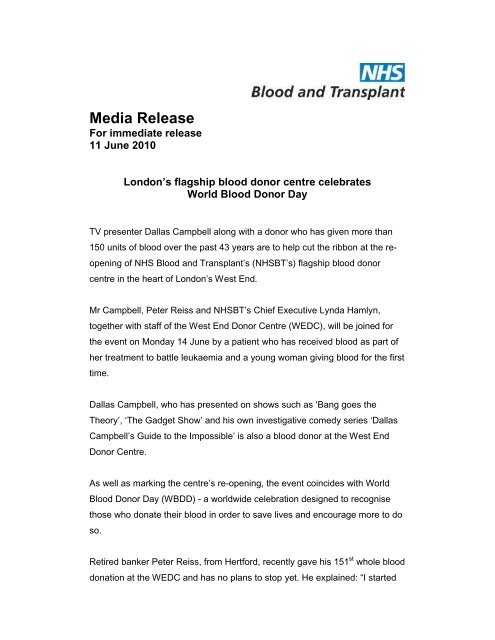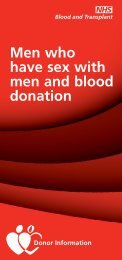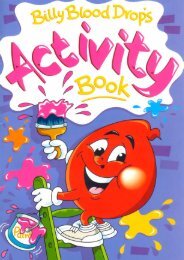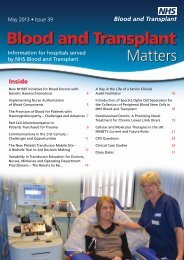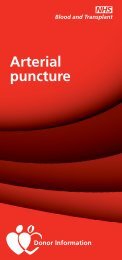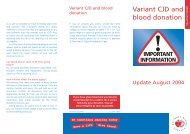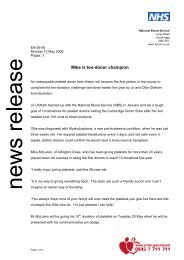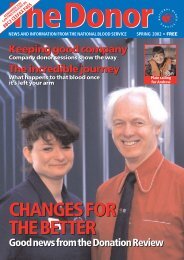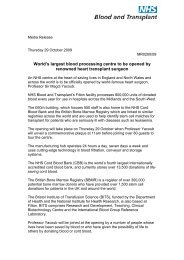Create successful ePaper yourself
Turn your PDF publications into a flip-book with our unique Google optimized e-Paper software.
<strong>Media</strong> <strong>Release</strong>For immediate release11 June 2010London’s flagship blood donor centre celebratesWorld <strong>Blood</strong> Donor DayTV presenter Dallas Campbell along with a donor who has given more than150 units of blood over the past 43 years are to help cut the ribbon at the reopeningof NHS <strong>Blood</strong> and Transplant’s (NHSBT’s) flagship blood donorcentre in the heart of London’s West End.Mr Campbell, Peter Reiss and NHSBT’s Chief Executive Lynda Hamlyn,together with staff of the West End Donor Centre (WEDC), will be joined forthe event on Monday 14 June by a patient who has received blood as part ofher treatment to battle leukaemia and a young woman giving blood for the firsttime.Dallas Campbell, who has presented on shows such as ‘Bang goes theTheory’, ‘The Gadget Show’ and his own investigative comedy series ‘DallasCampbell’s Guide to the Impossible’ is also a blood donor at the West EndDonor Centre.As well as marking the centre’s re-opening, the event coincides with World<strong>Blood</strong> Donor Day (WBDD) - a worldwide celebration designed to recognisethose who donate their blood in order to save lives and encourage more to doso.Retired banker Peter Reiss, from Hertford, recently gave his 151 st whole blooddonation at the WEDC and has no plans to stop yet. He explained: “I started
donating blood in 1967 as it was conveniently located near my place of work,and I don’t like to ever miss an appointment.“I have since retired but I continue to go and donate at the West End and thinkit’s important to make the effort to give blood if you can as you never knowwhen someone might need it. I hope I am an inspiration to young people thatgiving blood is easy, quick to do and saves lives.”Each blood donation can potentially save the lives of up to three people, soPeter could lay claim to saving 450 lives.When the WEDC was closed for refurbishment, a temporary donor centre wasset up in nearby Berners Street so that local collection of blood continued.Lynda Hamlyn said: “The WEDC is our flagship blood donor centre and weare delighted to officially re-open its doors for blood donation with a fresh andmodern look. The refurbished centre offers convenient opening times and amore streamlined service so blood donors will find it easier than ever to giveblood.“Both new and existing donors are invited to come and give blood and we areespecially encouraging younger people to consider blood donation as they arethe future generation of lifesavers.“We would like to thank all our dedicated blood donors for continuing to giveblood at our temporary mobile collection unit on Berners Street while therefurbishment took place and welcome them back to donate in a muchimproved environment at the WEDC.”The centre also offers early and late opening times four days a week to makeit as convenient as possible for people to fit in donating around work.Bengu Shail of Forest Hill, South East London, knows just how preciousdonated blood is. She is currently undergoing chemotherapy for Acute
Lymphoblastic Leukaemia and receives regular blood and platelettransfusions as her own blood and platelet levels drop as a result of thetreatment.Bengu said: “Before I was diagnosed I never thought for a moment that I wasill. I exercised regularly and never smoked or drank alcohol. In September lastyear I was admitted to hospital as I was feeling very tired and suffered frompersistent headaches. As part of my treatment I have received around 30units of red blood cells and 15 units of platelets and I know I simply wouldn’tbe here without the kindness of blood donors.”WBDD is celebrated by blood services worldwide and takes place every yearon 14 June, marking Karl Landsteiner’s birthday – the Nobel Prize winner whodiscovered the ABO blood group system. This year’s host is Barcelona,Spain, with the theme ‘New <strong>Blood</strong> for the World’ with the focus onencouraging a new generation of blood donors.Anyone aged between 17-65, weighing more than 50 kg (7st 12lbs) and ingeneral good health could potentially start saving lives by becoming a blooddonor. There is no upper age limit for donors who have donated in the last twoyears. To book an appointment to give blood at the West End Donor Centre orany other location please call the Donor Line on 0300 123 23 23 or visitwww.blood.co.ukEndsPhoto callThere will be an opportunity to photograph Dallas Campbell, our blood donorsand blood recipient, and NHSBT Chief Executive at 10.00am on Monday 14June at the WEDC. Interviews will be facilitated on request.Photos, editorial and interviews will be made available to those unable to attendthe event. Please call for more details.For further information or to confirm media attendance please contactRebecca Khan on 020 8322 6369 or email Rebecca.Khan@nhsbt.nhs.uk
Notes to editors West End <strong>Blood</strong> Donor Centre, 26 Margaret Street, London, W1W 8NBOpening Times:Monday – Thursday 8:00 – 19:30Friday 9:00 – 15:30 Work began on refurbishing the West End Donor Centre in October 2009to update the facilities and create a lighter and brighter environment forblood donors. The centre now boasts a new reception, an additionalscreening booth and a much improved donation area. NHS <strong>Blood</strong> and Transplant (NHSBT) is a Special Health Authority in theNHS. It is the organ donor organisation for the UK and is responsible formatching and allocating donated organs. Its remit also includes theprovision of a reliable, efficient supply of blood and associated servicesto the NHS. NHSBT’s donor line - 0300 123 23 23 - is available 24 hours a day,seven days a week with all calls charged at the standard local rate, evenfrom mobile phones. Last year the National <strong>Blood</strong> Service collected 1.9 million donations fromits base of 1.4 million donors. Whole blood donors can give blood threetimes a year. The NHS needs 7,000 units of blood daily to supply hospitals acrossEngland and North Wales. Currently, 4% of the eligible populationregularly give blood, helping to meet the demand. But new donors arealways needed. A unit of blood is measured as 470mls (or just under a pint) Whole blood donors can give three times per year There are four main blood groups – O, A, B and AB. Group O is the mostcommon and therefore the most in demand. Over 95 per cent of theblood collected is processed into its main components – red cells,platelets and plasma. A regular supply of blood is vital – red cells lastonly 35 days and platelets only five days


